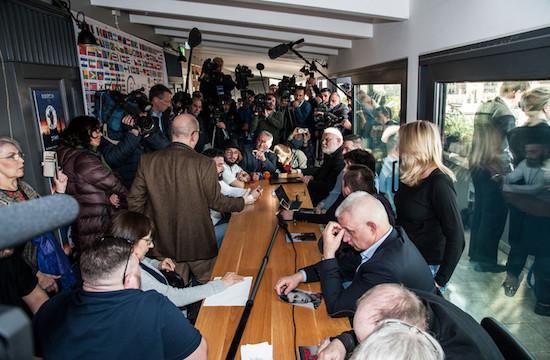|
The place of sexual abuse victims in the Vatican
By Céline Hoyeau And Gauthier Vaillant
For the victims, any priest or bishop who has committed or covered up sexual abuse should be dismissed from the clerical state Assembled beneath the banner of the international organization, Ending Clerical Abuse, victims of sexual abuse from all over the world were present in Rome for the Meeting on the Protection of Minors in the Church. The wind blowing across St. Peter's Square is ice-cold on this sunlit Sunday Feb. 24. But if Jean-Marie Fürbinger admits to being cold, it is because of the pope's concluding speech, not the wind. The 56-year-old from Switzerland said Pope Francis provided no concrete solutions and evaded the real issue by making reference to pornography on the Internet and sexual tourism in the world, instead of "directly addressing the problems in the Church." Fürbinger, a Physics teacher at the Polytechnical School of Lausanne, was abused by a Capuchin monk when he was 11. Nonetheless, he says that he is not one of those who are most angry with the Vatican, among the hundreds of victims from all over the world who came to Rome to be on the sidelines of the sex abuse summit. But he said, "Taking a stance like the one the pope has taken is doing wrong to those who have not lost all hope." The disappointment of the victims gathered under the banner of the international organization, Ending Clerical Abuse, was demonstrated in the streets of Rome throughout the three and a half days of the summit. They were determined not to allow this historic event to take place without them. Their main demand is for "zero tolerance." While the term has been used by several bishops and cardinals, it is not always given the same interpretation. For the victims, it's quite simple: any priest or bishop who has committed or covered up sexual abuse should be dismissed from the clerical state. Peter Isely, the co-founder of SNAP, the main victims group in the United States, reacted angrily to the pope's 21 recommendations, in which nothing on the measure of "zero tolerance" was clearly stated in black and white. Isely said this fact blocks out all other proposals regarding the issue. "You cannot build anything new, without first laying this foundation," he charged. The other deep disappointment victims expressed is that, despite everything, they remained on the fringe of the summit. "I don't understand why we do not have a permanent place in their reflections. It would save time: I saw how effective it was in Switzerland, where we have a tripartite commission made up of civil authorities, Church leaders and victims. We aren't children anymore," said Fürbringer, who is a member of the Swiss victims' association, SAPEC. Throughout the summit, victims gravitated towards the Vatican, making statements to the press and holding protests with slogans such as, "We don't want more promises, we want actions" and "Civil justice for all." They also carried a large cross, as many of the victims still claim to have faith. These victims came from all over the world. Their diverse origins illustrated that this is a "worldwide scourge". They also offered painful testimonies of their suffering. A young Italian who was abused when he was 11 explained tearfully how "everything [in his life] brings him flashbacks of what he suffered." Then there was Evelyn Korkmaz, an indigenous Canadian. She was a boarder at the Saint Anne's Indian Residential School in Ontario, where she says she was "physically, mentally and sexually abused" and torn from her cultural roots. There was also Benjamin Kitobo, the only victim here from Africa. He says he was raped at the minor seminary of Kanzenze, in the Diocese of Kolwezi, Democratic Republic of the Congo. He was expelled by the bishop at the time when he tried to tell what had happened to him. "In Africa, if you speak up, you are accused of defiling the Church. People still say there is no problem of sexual abuse in the Church in Africa," he said, intending to prove the contrary by his presence. Indeed, several presidents of African episcopal conferences made this kind of claim not long before the summit. But not all of the victims remained on the fringe of the summit. Several men and women, who wished to remain anonymous, were invited to give their testimony before the bishops – from the first day of the summit until the penitential liturgy. Their testimonies were harrowing, and deeply moved the summit's participants. Strengthened by this growing awareness, the victims are very determined to "continue to exert pressure." They say it is only on this unique condition — of zero tolerance — that the situation will truly evolve.
|
.
Any original material on these pages is copyright © BishopAccountability.org 2004. Reproduce freely with attribution.
